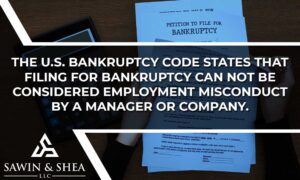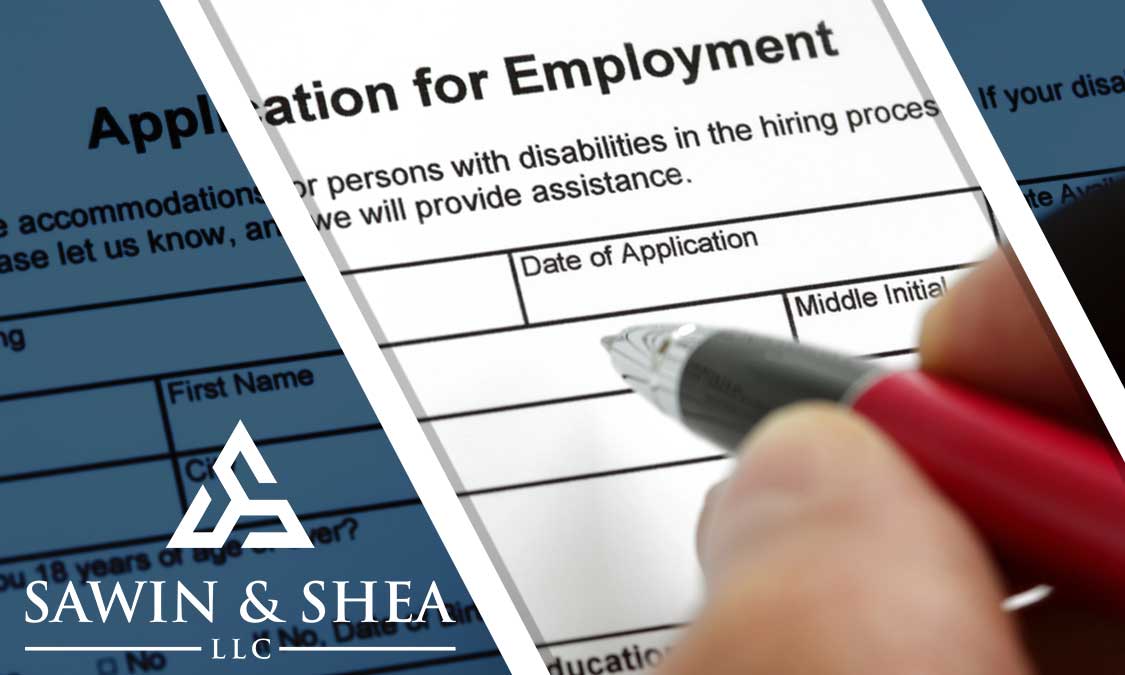Filing for bankruptcy can feel incredibly daunting, especially if you have concerns over whether it may impact your future job prospects. The sad reality is that many people hold misconceptions regarding bankruptcy filers. So, what happens if I get a job after filing Chapter 7?
They believe those declaring bankruptcy are irresponsible or bad with money.
The truth is that there’s nothing to be ashamed of in filing for bankruptcy — bankruptcy is a great option for debt relief and overcoming financial problems, and filing could be your best option for getting your finances back on track. Additionally, your personal bankruptcy will likely not impact job opportunities with a new employer.
That said, there are some situations in which your current or prospective employer will find out about your filing status.
In this blog, we take a close look at ways Chapter 7 bankruptcy affects future or current employment. If you have additional questions, we encourage you to read our online articles about filing bankruptcy. Additionally, you can reach out to the Sawin & Shea team for further support.
You can get a free consultation by contacting us online or calling us at (317) 759-1483, and we’ll review your personal situation.
What Is Chapter 7 Bankruptcy?
Chapter 7 is often referred to as liquidation bankruptcy. The bankruptcy court will liquidate non-exempt assets in order to pay back some of your debt. Fortunately, most of those who file bankruptcy are able to keep all of their possessions.
This form of bankruptcy differs from Chapter 13, which involves the evaluation of your current income to construct a three-to-five-year debt reorganization plan.
Bankruptcy Court Process
Now, let’s unpack what you can expect in your bankruptcy proceedings. When you file a Chapter 7 petition, you’ll receive an automatic stay protecting you from lawsuits and other collection efforts. This bankruptcy protection will prohibit a collection agency or another creditor from recovering debt or taking action against you.
You’ll also be assigned a trustee to manage your bankruptcy case. The bankruptcy trustee will oversee the process of liquidating non-exempt assets to repay your creditors, and they will organize a 341 meeting, also known as the Meeting of Creditors.
During this mandatory meeting, the trustee and attending creditors, if any, will ask you questions under oath regarding your financial situation. You’re not required to have legal representation in the meeting, but it’s best to have a bankruptcy lawyer to support and assist you.
Completing Chapter 7
To complete Chapter 7, you are required to undergo a finance management course as well as credit counseling. You must complete credit counseling within 180 days of filing your petition, and you’ll need to complete a debtor education course after your Meeting of Creditors.
After completing your required courses and undergoing the liquidation process, you’ll be able to discharge certain debts. The bankruptcy discharge will eliminate your unsecured debts, including unpaid medical bills and credit card debt.
Will My Bankruptcy Filing Impact My Current Employment?

In the event that you file for bankruptcy, it should not affect your current job. It is against federal law for an employer to fire an employee due to their bankruptcy filing, and this applies both to government agencies and private employers.
The U.S. Bankruptcy Code states that filing for bankruptcy can not be considered employment misconduct by a manager or company.
If an employer fires their employee due to a bankruptcy filing, it’s considered employment discrimination, and the former worker can sue them.
Bankruptcy Law
Additionally, bankruptcy law states that your place of employment cannot treat you differently for filing. Your employer cannot reduce your wages, demote you, or strip you of work responsibilities. An employee’s bankruptcy has no bearing on their work performance, and an employer cannot punish them for filing.

If you’ve filed for bankruptcy and it now impacts your current job, you should contact an employment lawyer.
There’s no excuse for workplace discrimination, and your bankruptcy case should have no impact on your status in the company.
Can Bankruptcy Affect My Job Application When Applying for Government Employment?
Government employers are prohibited from considering bankruptcy when determining whether to hire a job applicant. This means that if you apply for a government job, they cannot deny you employment due to your bankruptcy filing status.
Some public employers require job applicants to undergo a background check, especially if they need a security clearance. The government employer will learn that you have filed bankruptcy when you go through this process.
You may find this embarrassing, but the government agency still can’t deny you employment on the basis of your bankruptcy filing.
If you apply for a position with a federal, state, or local government agency, you can rest assured that your bankruptcy won’t get in the way of obtaining a job.
Can Bankruptcy Affect My Job Application When Applying in the Private Sector?

Unlike public employers, private employers can deny you a job for filing for bankruptcy, and bankruptcy can affect future employment in certain occupations. In practice, however, employers discriminating against a potential employee for filing a bankruptcy case is rare.
The way in which these private employers find out about applicants’ bankruptcy statuses is through credit checks. Chapter 7 filings can remain on credit reports for up to ten years.
In addition to bankruptcy issues, poor credit history can impact your ability to secure employment in finance management, and Chapter 7 will negatively impact your credit report.
Your prospective employer needs to obtain your consent before initiating a credit check, but they will likely deny you employment if you refuse to let them see your credit report.
Additionally, your potential employer may require you to obtain a security clearance, especially if the work involves government contracts. As discussed in the previous section, security clearances require background checks, and your employer will learn about your bankruptcy during the process.
There’s no guarantee that they will deny you a job, but they have the right to.
If a company requests to run a credit check or requires a security clearance, it’s likely in your best interest to be honest about having filed for bankruptcy, as they will most likely find out anyway. You do not want to let omitting information about your bankruptcy affect your new job. Fortunately, many private employers will not care about your bankruptcy.
Will My Current Employer Find Out About My Bankruptcy?
As we’ve discussed, your employer may find out about your bankruptcy if you undergo a credit check or a background check for a security clearance.
If you are currently employed and need to file bankruptcy, you may wonder whether your work will find out. Again, potential bankruptcy filers don’t need to worry about losing their jobs, as this is considered discrimination, but you may be concerned about your manager or co-workers thinking of you differently.
Fortunately, it’s unlikely that your place of employment will find out that you filed for bankruptcy, and most employers will not care. That said, there are a few ways in which employers learn about employee bankruptcy filings. If you had a wage garnishment, filing bankruptcy will halt the financial encumbrance, and your employer will be notified that they no longer need to set aside part of your wages for a creditor.
Additionally, employers learn about bankruptcy filings when employees owe money to them. You must list all forms of debt when filing, and that includes if you owe an employer money.
After filing for bankruptcy, the bankruptcy trustee will inform your employer about your bankruptcy status as well as details regarding the Meeting of Creditors.
Will The Bankruptcy Court Publish My Filing?
It’s important to note that the court will publish your bankruptcy case, making it part of public record that many employers may check. This means anyone searching for your filing status will be able to find it online. That said, if your employer has no reason to search for you if you’ve filed bankruptcy, it’s unlikely that they will find out.
Contact a Bankruptcy Attorney
If you’re considering filing bankruptcy, we wholeheartedly encourage research to find your best options. While there are many online articles available, it’s best to enlist the help of an experienced bankruptcy attorney. They can help you by protecting you from aggressive creditors, and they can assist you with getting your finances back on track. Finally, an experienced bankruptcy attorney can help you with bankruptcy paperwork as well as other steps in the filing process on your path to debt relief.
This will ensure you do everything correctly so that you can discharge all eligible debts and become desirable to any employer.
For assistance from a bankruptcy lawyer in Indiana, contact Sawin & Shea LLC. We have over 45 years of combined experience assisting Indiana residents through the bankruptcy process, and we offer support in filing Chapter 7 and Chapter 13 bankruptcy.



